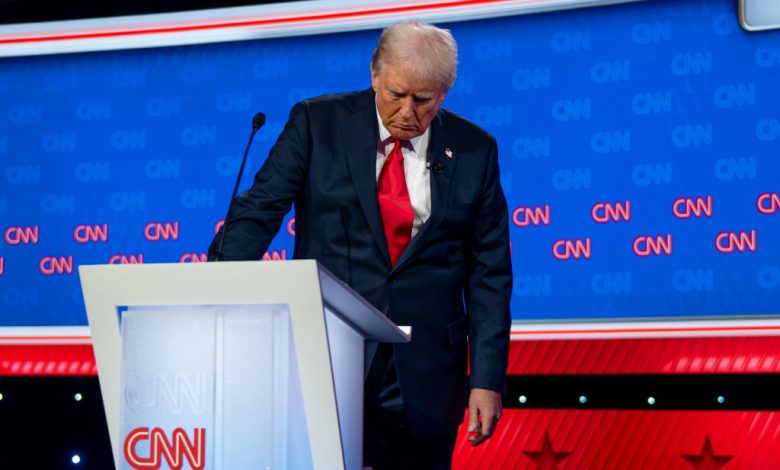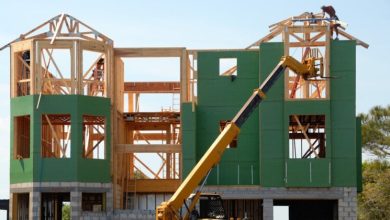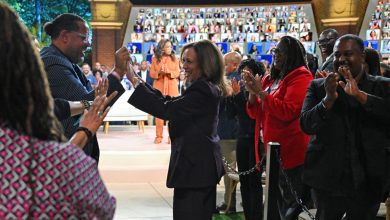What Are ‘Black Jobs’? Trump Debate Claim Mocked, Questioned


Republican presidential candidate Donald Trump at the CNN Presidential Debate at the CNN Studios on June 27, 2024, in Atlanta, Georgia. | Source: Andrew Harnik / Getty
As President Joe Biden and Donald Trump were squaring off about the economy during the presidential debate in Atlanta, the presumptive nominee made a curious claim about the Black unemployment rate and immigration that didn’t quite sit right with some folks on social media.
Two words in particular — “Black jobs” — were among the top trending topics following Trump’s disingenuously boasting about the economy he left for Biden in 2020.
Once the debate finally turned to the topics concerning Black voters — following exhaustive bickering about issues like abortion, immigration, the Israeli-led violence in Gaza, the Capitol riots and much more — the candidates were asked about their legacies with Black America.
After Biden cited a laundry list of accomplishments like prioritizing Black maternal health, championing Black-owned businesses and reducing the Black unemployment rate to the lowest it has ever been, Trump immediately deflected by criticizing Biden’s record on immigration.
It was in that context that Trump insisted undocumented immigrants were illegally crossing the border and “taking Black jobs now.”
(No, immigrants are not stealing jobs from Black Americans…)
He went on to repeat the equally vague and racist term without providing any proof of his claim.
Watch below.
Journalist Marc Lamont Hill questioned why the moderators would let such a claim stand.
Others poked fun and found some humor in Trump’s words, which were mocked heavily on social media.
But generally, people just wanted to know exactly what Trump meant by “Black jobs.”
Thursday night’s debate unfolded hours after a new national poll found that Trump was enjoying a slight lead over Biden.
If the presidential election was held today, 48% of respondents to the New York Times/Siena College poll conducted last week said they would vote for Trump, while 44% said they would vote for Biden.
About 800 media outlets from around the world were granted press credentials to cover the debate in Atlanta. However, a report on Wednesday claimed that none of them represented Black media, which would be a glaring omission in a city considered the “Black mecca” and a state where Black voters are a formidable force. CNN, which aired the debate, denied refusing any debate press credentials to Black media and instead suggested that any outlet that didn’t receive press access must have missed the application deadline.
Speaking on behalf of the CBC, CBCPAC Chairman and New York Rep. Gregory Meeks said the apparent snub was “totally unacceptable” and demanded at least 10 Black media outlets be credentialed for the debate.
On Thursday, the National Association of Black Journalists (NABJ) appealed to CNN to make an exception in this case.
“No matter the reason the local Black Press was not approved, in regard to guidelines, we are asking CNN to create space to ensure fair and balanced coverage so that all citizens have access to real-time content from the debate,” NABJ said in a statement.
The debate proceeded with that matter decidedly unresolved.
The debate in Atlanta was announced abruptly last month after Biden and Trump agreed to square off on the issues twice. But in doing so, an HBCU inadvertently became collateral damage from the agreement when Virginia State University was among the colleges dropped from the original schedule of 2024 presidential debates.
The storied institution located in the city of Petersburg would have become the first and only HBCU to host a presidential debate. The now-canceled debate at VSU was scheduled to be held on Oct. 1 and would have been the second of three presidential debates this year.
While VSU was the first HBCU chosen to host a presidential debate for the general election, Texas Southern University in 2019 hosted a debate in Houston for candidates seeking the Democratic presidential nomination in a field that included Biden and now-Vice President Kamala Harris.
Back then, the acting dean of Texas Southern University told ABC News why it was so important for a historically Black college or university to host such an event.
“A lot of people don’t even know HBCUs exist, they don’t understand or know the mission of our institutions or why they are still relevant today,” Dr. Rockwell Brown Burton said. “Some might argue they are not needed or that they’re not relevant, but I would strongly disagree.”
SEE ALSO:
Trump Campaign Marks Juneteenth By Saying That ‘Light Will Always Triumph Over Darkness’
Exclusive First Listen: New Biden-Harris Radio Ad Spotlights ‘Promises Kept’ To Black America





